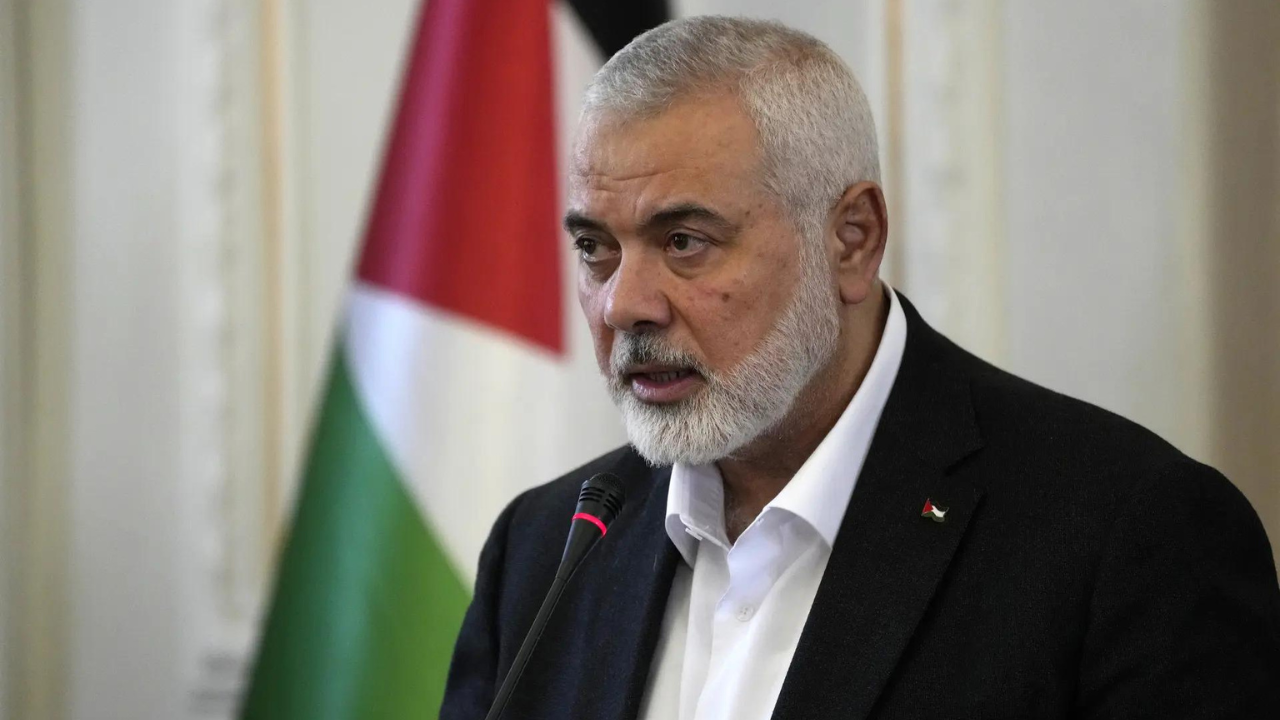As if he sensed his death approaching, Hamas leader Ismail Haniyeh’s final words to Iranian supreme leader Ayatollah Ruhollah Ali Khamenei before his assassination in Tehran were a Koranic verse reflecting on life, death, immortality, and resilience.
The exchange of words took place shortly before an Israeli strike claimed his life. Known for his tough stance and commitment to the Palestinian cause, Haniyeh’s death marks the third assassination of a Hamas leader by Israel in the last two decades.
‘If a leader leaves, another will arise’
“It is Allah who gives life and causes death. And Allah is all-aware of all actions … ‘If a leader leaves, another will arise’,” Haniyeh said in Arabic during his speech to Khamenei. A few hours later, he was killed in a suspected Israeli strike on his guest house.
This statement, broadcast on television as Haniyeh addressed Khamenei, underlined the Islamist beliefs that shaped his life and approach to the Palestinians’ conflict with Israel. He was inspired by the late Hamas founder Sheikh Ahmed Yassin, who advocated for Jihad against Israel in the 1980s. Israel imprisoned and ultimately assassinated Yassin in 2004, yet Hamas evolved into a formidable military entity.
In a 1994 interview with Reuters in Gaza, Haniyeh, who was buried in Qatar on Friday, credited Yassin with teaching that Palestinians could only regain their occupied homeland through “the purified arms of its men and their struggle.”
“No Muslim should die in his bed while ‘Palestine’ remains occupied,” he quoted Yassin as saying.
For Palestinian supporters, Haniyeh and other Hamas leaders represent fighters for liberation from Israeli occupation, persistently advocating their cause when international diplomacy has faltered.
He said he learned from Sheikh Yassin “the love of Islam and sacrifice for this Islam and not to kneel down to tyrants and despots.”
Haniyeh emerged as the tough-talking face of the Palestinian group’s international diplomacy amid ongoing conflict in Gaza. Tragically, three of his sons – Hazem, Amir, and Mohammad – and four of his grandchildren were killed in an Israeli airstrike in April. An estimated 60 other members of his extended family were also casualties of the Gaza war.
“The blood of my children is not more valuable than the blood of the children of the Palestinian people … All the martyrs of Palestine are my children,” he said after their deaths.
“Through the blood of the martyrs and the pain of the injured, we create hope, we create the future, we create independence and freedom for our people,” he stated. “We say to the occupation that this blood will only make us more steadfast in our principles and attachment to our land.”
‘Normalisation will not end conflict’
Haniyeh was appointed to the top Hamas position in 2017 and traveled between Turkey and Qatar’s capital Doha. This mobility allowed him to evade the travel restrictions of the blockaded Gaza Strip and facilitated his role in ceasefire negotiations and dialogues with Hamas’ ally Iran.
“All the agreements of normalisation that you [Arab states] signed with [Israel] will not end this conflict,” Haniyeh declared shortly after Hamas fighters launched the October 7 attack that resulted in the deaths of 1,200 people in Israel and the capture of 250 hostages.
Israel responded with a military campaign that has killed around 40,000 people inside Gaza so far and left much of the enclave in ruins.
Arrest warrants for war crimes
In May, the International Criminal Court prosecutor’s office requested arrest warrants for three Hamas leaders, including Haniyeh, and Israeli Prime Minister Benjamin Netanyahu, for alleged war crimes. Both Israel and Palestinian leaders have dismissed these allegations.
Haniyeh is the third Hamas leader assassinated by Israel over the past two decades. Israel previously killed Sheikh Yassin and his successor Abdel-Aziz al-Rantissi within a month of each other in helicopter airstrikes in 2004.
Khaled Meshaal, who is expected to succeed Haniyeh as leader, survived a botched assassination attempt ordered by Netanyahu in 1997.
Adeeb Ziadeh, a specialist in Palestinian affairs at Qatar University, emphasized that Hamas is an ideology and that the killing of Haniyeh will not dismantle the group or force it to surrender.
“Every time Hamas lost one leader, another leader came, sometimes even stronger in his performance and fulfilling Hamas principles,” Ziadeh said.
Israel announced on Thursday that Mohammed Deif, one of the masterminds of the Oct. 7 attack, was killed in an Israeli airstrike in Gaza last month. Saleh Al-Arouri, one of the founders of Hamas’ military wing, was also killed in an Israeli drone strike on Beirut’s southern suburbs in January 2024.
Military capability
Hamas’ 1988 founding charter called for the destruction of Israel, although Hamas leaders have occasionally proposed a long-term truce in exchange for a viable Palestinian state on all territories occupied by Israel in the 1967 war. Israel, however, considers this a ruse.
Over the decades, Hamas has fired thousands of rockets at Israel and engaged in several wars with the Israeli army, while continuously building up its military capabilities. Hamas also orchestrated suicide bombings in Israel during the 1990s and 2000s.
In 2012, when asked by Reuters if Hamas had abandoned the armed struggle, Haniyeh replied, “of course not,” and asserted that resistance would persist “in all forms – popular resistance, political, diplomatic and military resistance.”
Despite his tough rhetoric, Haniyeh was viewed by some Arab diplomats and officials as relatively moderate compared with more hardline members of Hamas inside Gaza, where the group’s military wing planned the October 7 attack under the leadership of Yahya Sinwar.
‘Drowning in the sands of Gaza’
While addressing Israel’s military, he warned they would find themselves “drowning in the sands of Gaza,” but behind the scenes, Haniyeh and his predecessor Khaled Meshaal engaged in talks over a Qatari-brokered ceasefire deal with Israel, which included exchanging hostages for Palestinians imprisoned in Israel.
Haniyeh, a Sunni Muslim, played a major role in bolstering Hamas’ military capacity by nurturing ties with Shi’ite Muslim Iran, which has openly provided military and financial support to the group.
Upon leaving Gaza in 2017, Haniyeh was succeeded as the Hamas leader in the territory by Sinwar, a hardliner who spent more than two decades in Israeli prisons.
The exchange of words took place shortly before an Israeli strike claimed his life. Known for his tough stance and commitment to the Palestinian cause, Haniyeh’s death marks the third assassination of a Hamas leader by Israel in the last two decades.
‘If a leader leaves, another will arise’
“It is Allah who gives life and causes death. And Allah is all-aware of all actions … ‘If a leader leaves, another will arise’,” Haniyeh said in Arabic during his speech to Khamenei. A few hours later, he was killed in a suspected Israeli strike on his guest house.
This statement, broadcast on television as Haniyeh addressed Khamenei, underlined the Islamist beliefs that shaped his life and approach to the Palestinians’ conflict with Israel. He was inspired by the late Hamas founder Sheikh Ahmed Yassin, who advocated for Jihad against Israel in the 1980s. Israel imprisoned and ultimately assassinated Yassin in 2004, yet Hamas evolved into a formidable military entity.
In a 1994 interview with Reuters in Gaza, Haniyeh, who was buried in Qatar on Friday, credited Yassin with teaching that Palestinians could only regain their occupied homeland through “the purified arms of its men and their struggle.”
“No Muslim should die in his bed while ‘Palestine’ remains occupied,” he quoted Yassin as saying.
For Palestinian supporters, Haniyeh and other Hamas leaders represent fighters for liberation from Israeli occupation, persistently advocating their cause when international diplomacy has faltered.
He said he learned from Sheikh Yassin “the love of Islam and sacrifice for this Islam and not to kneel down to tyrants and despots.”
Haniyeh emerged as the tough-talking face of the Palestinian group’s international diplomacy amid ongoing conflict in Gaza. Tragically, three of his sons – Hazem, Amir, and Mohammad – and four of his grandchildren were killed in an Israeli airstrike in April. An estimated 60 other members of his extended family were also casualties of the Gaza war.
“The blood of my children is not more valuable than the blood of the children of the Palestinian people … All the martyrs of Palestine are my children,” he said after their deaths.
“Through the blood of the martyrs and the pain of the injured, we create hope, we create the future, we create independence and freedom for our people,” he stated. “We say to the occupation that this blood will only make us more steadfast in our principles and attachment to our land.”
‘Normalisation will not end conflict’
Haniyeh was appointed to the top Hamas position in 2017 and traveled between Turkey and Qatar’s capital Doha. This mobility allowed him to evade the travel restrictions of the blockaded Gaza Strip and facilitated his role in ceasefire negotiations and dialogues with Hamas’ ally Iran.
“All the agreements of normalisation that you [Arab states] signed with [Israel] will not end this conflict,” Haniyeh declared shortly after Hamas fighters launched the October 7 attack that resulted in the deaths of 1,200 people in Israel and the capture of 250 hostages.
Israel responded with a military campaign that has killed around 40,000 people inside Gaza so far and left much of the enclave in ruins.
Arrest warrants for war crimes
In May, the International Criminal Court prosecutor’s office requested arrest warrants for three Hamas leaders, including Haniyeh, and Israeli Prime Minister Benjamin Netanyahu, for alleged war crimes. Both Israel and Palestinian leaders have dismissed these allegations.
Haniyeh is the third Hamas leader assassinated by Israel over the past two decades. Israel previously killed Sheikh Yassin and his successor Abdel-Aziz al-Rantissi within a month of each other in helicopter airstrikes in 2004.
Khaled Meshaal, who is expected to succeed Haniyeh as leader, survived a botched assassination attempt ordered by Netanyahu in 1997.
Adeeb Ziadeh, a specialist in Palestinian affairs at Qatar University, emphasized that Hamas is an ideology and that the killing of Haniyeh will not dismantle the group or force it to surrender.
“Every time Hamas lost one leader, another leader came, sometimes even stronger in his performance and fulfilling Hamas principles,” Ziadeh said.
Israel announced on Thursday that Mohammed Deif, one of the masterminds of the Oct. 7 attack, was killed in an Israeli airstrike in Gaza last month. Saleh Al-Arouri, one of the founders of Hamas’ military wing, was also killed in an Israeli drone strike on Beirut’s southern suburbs in January 2024.
Military capability
Hamas’ 1988 founding charter called for the destruction of Israel, although Hamas leaders have occasionally proposed a long-term truce in exchange for a viable Palestinian state on all territories occupied by Israel in the 1967 war. Israel, however, considers this a ruse.
Over the decades, Hamas has fired thousands of rockets at Israel and engaged in several wars with the Israeli army, while continuously building up its military capabilities. Hamas also orchestrated suicide bombings in Israel during the 1990s and 2000s.
In 2012, when asked by Reuters if Hamas had abandoned the armed struggle, Haniyeh replied, “of course not,” and asserted that resistance would persist “in all forms – popular resistance, political, diplomatic and military resistance.”
Despite his tough rhetoric, Haniyeh was viewed by some Arab diplomats and officials as relatively moderate compared with more hardline members of Hamas inside Gaza, where the group’s military wing planned the October 7 attack under the leadership of Yahya Sinwar.
‘Drowning in the sands of Gaza’
While addressing Israel’s military, he warned they would find themselves “drowning in the sands of Gaza,” but behind the scenes, Haniyeh and his predecessor Khaled Meshaal engaged in talks over a Qatari-brokered ceasefire deal with Israel, which included exchanging hostages for Palestinians imprisoned in Israel.
Haniyeh, a Sunni Muslim, played a major role in bolstering Hamas’ military capacity by nurturing ties with Shi’ite Muslim Iran, which has openly provided military and financial support to the group.
Upon leaving Gaza in 2017, Haniyeh was succeeded as the Hamas leader in the territory by Sinwar, a hardliner who spent more than two decades in Israeli prisons.
Source : Times of India






